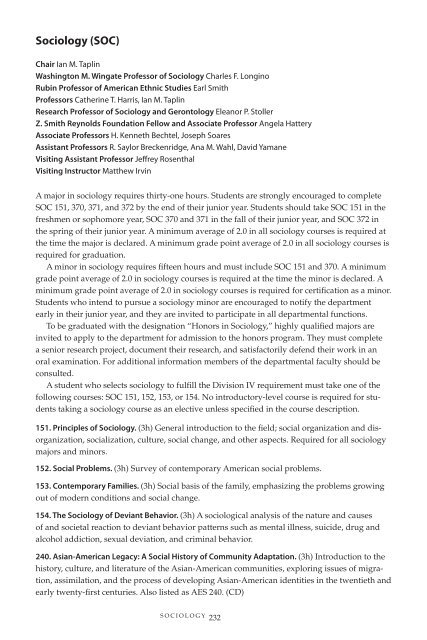theundergraduateschoo ls - Wake Forest University
theundergraduateschoo ls - Wake Forest University
theundergraduateschoo ls - Wake Forest University
You also want an ePaper? Increase the reach of your titles
YUMPU automatically turns print PDFs into web optimized ePapers that Google loves.
Sociology (SOC)<br />
Chair Ian M. Taplin<br />
Washington M. Wingate Professor of Sociology Charles F. Longino<br />
Rubin Professor of American Ethnic Studies Earl Smith<br />
Professors Catherine T. Harris, Ian M. Taplin<br />
Research Professor of Sociology and Gerontology Eleanor P. Stoller<br />
Z. Smith Reynolds Foundation Fellow and Associate Professor Angela Hattery<br />
Associate Professors H. Kenneth Bechtel, Joseph Soares<br />
Assistant Professors R. Saylor Breckenridge, Ana M. Wahl, David Yamane<br />
Visiting Assistant Professor Jeffrey Rosenthal<br />
Visiting Instructor Matthew Irvin<br />
A major in sociology requires thirty-one hours. Students are strongly encouraged to complete<br />
SOC 151, 370, 371, and 372 by the end of their junior year. Students should take SOC 151 in the<br />
freshmen or sophomore year, SOC 370 and 371 in the fall of their junior year, and SOC 372 in<br />
the spring of their junior year. A minimum average of 2.0 in all sociology courses is required at<br />
the time the major is declared. A minimum grade point average of 2.0 in all sociology courses is<br />
required for graduation.<br />
A minor in sociology requires fifteen hours and must include SOC 151 and 370. A minimum<br />
grade point average of 2.0 in sociology courses is required at the time the minor is declared. A<br />
minimum grade point average of 2.0 in sociology courses is required for certification as a minor.<br />
Students who intend to pursue a sociology minor are encouraged to notify the department<br />
early in their junior year, and they are invited to participate in all departmental functions.<br />
To be graduated with the designation “Honors in Sociology,” highly qualified majors are<br />
invited to apply to the department for admission to the honors program. They must complete<br />
a senior research project, document their research, and satisfactorily defend their work in an<br />
oral examination. For additional information members of the departmental faculty should be<br />
consulted.<br />
A student who selects sociology to fulfill the Division IV requirement must take one of the<br />
following courses: SOC 151, 152, 153, or 154. No introductory-level course is required for students<br />
taking a sociology course as an elective unless specified in the course description.<br />
151. Principles of Sociology. (3h) General introduction to the field; social organization and disorganization,<br />
socialization, culture, social change, and other aspects. Required for all sociology<br />
majors and minors.<br />
152. Social Problems. (3h) Survey of contemporary American social problems.<br />
153. Contemporary Families. (3h) Social basis of the family, emphasizing the problems growing<br />
out of modern conditions and social change.<br />
154. The Sociology of Deviant Behavior. (3h) A sociological analysis of the nature and causes<br />
of and societal reaction to deviant behavior patterns such as mental illness, suicide, drug and<br />
alcohol addiction, sexual deviation, and criminal behavior.<br />
240. Asian-American Legacy: A Social History of Community Adaptation. (3h) Introduction to the<br />
history, culture, and literature of the Asian-American communities, exploring issues of migration,<br />
assimilation, and the process of developing Asian-American identities in the twentieth and<br />
early twenty-first centuries. A<strong>ls</strong>o listed as AES 240. (CD)<br />
S O C I O L O G Y 232






